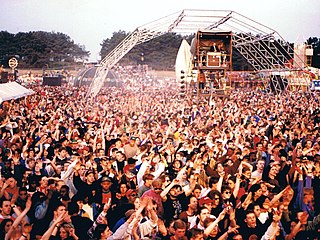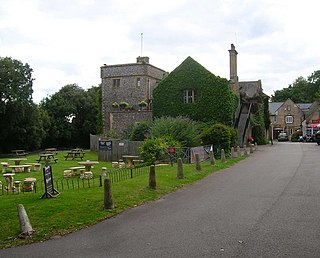 W
WBoomtown is an independent immersive five-day theatrical music festival held annually near Winchester, Hampshire on the Matterley Estate in South Downs National Park. It was first held in 2009 and has been held in its current site since 2011. Its diverse line-up of bands, DJs and speakers perform on many different stages each a part of a district with its own unique theming. Each yearly event is known as a Chapter and expands on the storyline from the previous year, told through the sets, live actors and many forms of alternate reality games. The festival site is split into several districts, and the narrative is reflected in the design of the districts, streets and venues, which are populated by hundreds of actors to play the role of inhabitants.
 W
WThe Castlemorton Common Festival was a week-long free festival and rave held in the Malvern Hills near Malvern, Worcestershire, England between 22 and 29 May 1992. The media interest and controversy surrounding the festival, and concerns as to the way it was policed, inspired the legislation that would eventually become the Criminal Justice and Public Order Act 1994.
 W
WThe Criminal Justice and Public Order Act 1994 (c.33) is an Act of the Parliament of the United Kingdom. It introduced a number of changes to the law, most notably in the restriction and reduction of existing rights, clamping down on unlicensed rave parties, and greater penalties for certain "anti-social" behaviours. The Bill was introduced by Michael Howard, Home Secretary of Prime Minister John Major's Conservative government, and attracted widespread opposition.
 W
WExodus Collective was a community collective and sound system formed in 1992, in the Marsh Farm area of Luton, England. It organised free parties and became involved in housing, social exclusion, and community projects, founded upon the principle of DIY culture. The group squatted buildings and repeatedly came into conflict with Bedfordshire Police, which by 1995 had resulted in Bedfordshire County Council voting for a public inquiry into alleged police harassment. The license of a pub owned by the mother of people in the collective was revoked, a decision which was later overturned by a judicial review.
 W
WFantazia was a rave music promoter based in the United Kingdom. It was founded in 1991 by James Perkins, Gideon Dawson & Chris Griffin, and held a number of seminal raves at the height of the breakbeat hardcore scene.
 W
WGatecrasher is an international clubbing brand made famous by the "Gatecrasher" dance music events, which were held at the Republic nightclub in Sheffield, UK during the late 1990s and early 2000s. The promoters of the brand were Linus Schaxmann, Simon Raine and Simon Oates and, until 2004, Scott Bond. By August 2014, the only Gatecrasher venue remaining was located in the United Kingdom city of Birmingham. This venue was closed down permanently by the authorities on 25 November 2015.
 W
WThe Orb is an electronic music group founded in 1988 by Alex Paterson and The KLF member Jimmy Cauty. Beginning as ambient and dub DJs in London, their early performances were inspired by electronic artists of the 1970s and 1980s, most notably Brian Eno and Kraftwerk. Because of their psychedelic sound, the Orb developed a cult following among clubbers "coming down" from drug-induced highs.
 W
WRaindance are British rave event organisers. They were one of the best known rave names on the rave scene in the late 1980s and early 1990s.
 W
WThe Sanctuary Music Arena was a 22,000 sq ft, 3,500 capacity music venue in Denbigh North, Milton Keynes in the UK, and most well known for its connection to the rave scene.
 W
WSpiral Tribe, also known as SP23, are a musical and arts collective and free party sound system that organised parties, festivals and raves in the UK and Europe in the 1990s. They were involved in the Castlemorton Common Festival.
 W
WSterns was a nightclub located at Highdown Towers on Highdown Hill in Worthing, West Sussex. It was situated off the A259 road just north of Ferring on the South Downs. It became known as a major centre of UK rave culture in the south of England during the late 1980s and early 1990s. It was a rare example of an early UK club boasting 4 separate rooms with DJs playing house, breakbeat hardcore, jungle music, techno, progressive house and hard house.
 W
WTilllate, formerly M8, is a dance music, club culture and lifestyle magazine. Formerly printed, it is now an online magazine with the option to print. It was established in Scotland in 1988.
 W
WTribal Gathering was a British dance music festival that between 1993 and 2004 catered for different types of dance music cultures such as drum and bass, techno and house.